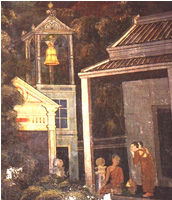 |
Lay
devotees offer rain-robes to the monks |
Long before the time of the Buddha, wandering ascetics would find a place to settle during the months of the monsoon, and the Buddha and his followers also adopted this practice. This three month period of settled monastic life is known as Vassa, the ‘rains retreat’, and it is still part of monastic rule that during this time—beginning on the day following the full moon of the month of Asalha (Asalha Puja)—monks and nuns cannot spend the night outside their place of retreat.
The last day of the retreat is known as ‘leaving the Vassa’ or Pavarana. In appreciation of the fact that such long-term containment can cause difficulty between people, a ceremony was created to release some of this tension. Pavarana means ‘to invite’, and on this day those who have kept the retreat ask their brothers and sisters to offer reflections on their behaviour:
“Venerable Ones, I invite admonition from the Sangha. According to what has been seen, heard or suspected, may the venerable ones instruct me out of compassion. Seeing it, I shall make amends...”
If criticism is forthcoming, it is expected that it should be welcomed in the spirit in which it is given and that any necessary atonements should be made.